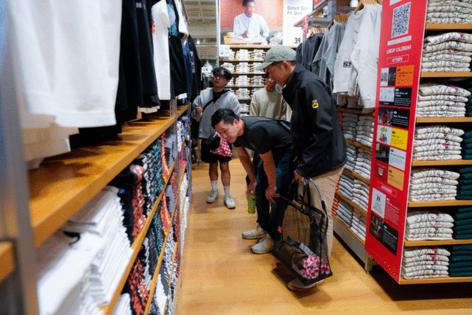US consumer sentiment slides while inflation expectations jump
Published in Business News
U.S. consumer sentiment fell to one of the lowest readings on record and long-term inflation expectations climbed to the highest since 1991 on fears of the economic fallout from tariffs.
The final April sentiment index fell to 52.2 from 57 a month earlier, according to the University of Michigan. While a slight improvement from the preliminary gauge of 50.8, the latest figure is the fourth-lowest in data back to the late 1970s.
Consumers anticipated inflation will rise at an annual rate of 4.4% over the next five to 10 years, the data out Friday showed. They expect prices to rise at a 6.5% pace over the next year. While down from a preliminary reading of 6.7%, year-ahead price expectations are still the highest since 1981.
The survey began March 25 and concluded April 21, a period that included President Donald Trump’s announcement of a 90-day pause on higher tariffs for dozens of U.S. trading partners. He also raised duties on Chinese goods to an eye-watering 145%.
In addition to stoking fears of higher inflation, the Trump administration’s trade policies are elevating anxiety about the economy and labor market. The university’s expectations index slumped to 47.3, the lowest since 2022, as 60% of respondents offered unsolicited comments about the hit from tariffs.
“Labor market expectations remained bleak,” Joanne Hsu, director of the survey, said in a statement. “Even more concerning for the path of the economy, consumers anticipated weaker income growth for themselves in the year ahead. Without reliably strong incomes, spending is unlikely to remain strong amid the numerous warnings signs perceived by consumers.”
The decline in consumer expectations was broad across demographic, income and political groups, the survey showed. Moreover, expectations for the economy, incomes, the stock market and homebuying conditions worsened from a month earlier.
About two-thirds of respondents see their inflation-adjusted incomes falling in the year ahead. Nearly as many expect unemployment to rise.
Corporate leaders are warning of more financial pain ahead for shoppers as companies pass along higher tariffs and commodities costs. Procter & Gamble Co. estimated on Thursday that the current and proposed levies could add between $1 billion and $1.5 billion to its annual costs. The consumer goods giant plans to counter that in part by raising prices on its products.
“Tariffs are inherently inflationary,” P&G Chief Executive Officer Jon Moeller told CNBC.
Expectations decreased in the University of Michigan survey across political lines. For Democrats and political independents, they worsened to a fresh record low. Among Republicans, expectations dropped to a five-month low.
The current conditions gauge declined 4 points from a month earlier to 59.8, but improved from the 56.5 preliminary reading due to the pause in tariffs.
©2025 Bloomberg L.P. Visit bloomberg.com. Distributed by Tribune Content Agency, LLC.












Comments